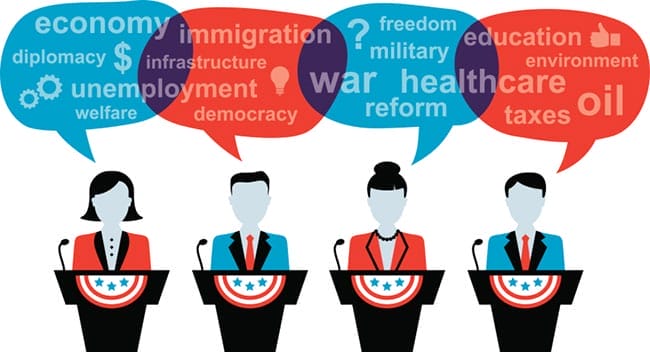OK, two-and-a-half down, 10 debates to go (four in 2015) for those seeking to be the Republican Party’s presidential nominee. There will be six debates (three in 2015) for those aspiring to be the Democrat Party’s nominee.
In the coming days and months, debate-podium performances will be calibrated. Pundits will weigh in. Focus groups will report.
And yet, really, aren’t there evaluative tools and assessment criteria that should be added to the mix?
A rhetorical question, obviously, and self-interested as well; I’m working on a set of criteria to parallel the ratings employed by Fitch, Moody’s, and Standard & Poor’s for investment instruments. After all, politicians are investment vehicles, right? Shouldn’t voters—and especially prospective supporters and contributors—have a better sense of which candidates are “investment-grade”–and which candidates are more likely to default on their promises? Donors expect a yield—a return on principal (actually, a return on principle).
Yes, I’m mixing debt and equity issues. (I need a few months to sort out the terminology—it’s been a few years.) But the PACs (think institutional investors and hedge funds) along with big-checkbook individuals (private equity) and special interests (venture capital types) are not so very different from the millions who tuned in to the first Republican presidential debate for what might correlate to pitches from startups seeking access to capital (and the Capitol).
For those August 6 debates, I heard that over 40,000 questions were submitted to Fox News. My question did not make the cut. Too many words—too many sentences, too much intro and lead-up. I should have known better.
I’ll share the essence of my question with you (jettisoning many of the original syllables) for the question pertains to money—mega-money: I want each and every presidential aspirant—Republican and Democrat—to tell me (well, all of us) if, and how, they would release the $150 billion to Iran that has been “quarantined.”
Wouldn’t such a question require candidates to disclose some “forward-thinking” that could then be factored into an analysis of the respective aspirants’ “credit-worthiness”?
Am I so far off in thinking that candidates seeking refinancing should be subject to the kind of scrutiny that a startup or a mid-cap undergoes? Or that is given to an IPO? After all, candidates are forever making public offerings, even as they continue to leverage and releverage.
Am I so far off in likening campaign contributions to the creation of uncollaterized or unsecured obligations?
The candidates who continue to explore various voter markets become more and more highly leveraged, indebted, under heavier debt-service commitments—aren’t they?
I came to this thinking by virtue of an analogy that still strikes me as apt. (I did devise the analogy, after all.)
More in the coming months as I campaign for my own rating system.
Editor’s note: Readers who care to wade into Professor Cooper’s literary and metaphorical approach to the Iran nuclear deal, read his previous articles on The Huffington Post here and here.


























